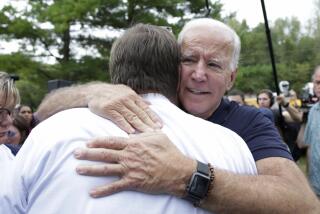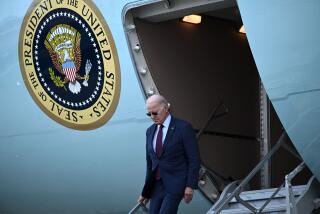News ANALYSIS : ‘No-Pain’ Style May Hurt Bush in Long Run
- Share via
WASHINGTON — At the end of last month’s U.S.-Latin American drug summit, a reporter asked President Bush how he could expect South American peasants to stop producing cocaine unless America agreed to pay higher prices for “alternative” products, such as coffee.
The President immediately acknowledged the point--”these economies are hurting,” he conceded--but he insisted that his hands were tied. “I have a problem” in backing the Latins’ pleas for higher coffee prices, he said. American consumers “don’t necessarily want to pay” any more than they are.
It was a casual, offhand remark, but a revealing one. Although the President has cited the war on drugs as the issue that is likely to prove most crucial for him politically, he seems reluctant to embrace solutions that involve sacrifice by Americans.
The incident is not an isolated one. After 14 months in office, Bush, who has said he wants to become the “education President” and the “environmental President,” is emerging instead as a “no-pain President,” reluctant to ask voters to accept any short-term discomforts even if they are likely to result in long-term returns.
William Schneider, a political analyst at the American Enterprise Institute, a conservative-oriented think tank, calls Bush “a status quo President” who has shunned any call for “a sense of a higher rationale” that might help produce bold, long-term results.
There is no question that Bush’s low-key style is a change of pace. History books are brimming with calls for sacrifice by Bush’s predecessors: During the depths of the 1981-82 recession, Ronald Reagan called on Americans to “stay the course.” In the face of the Arab oil embargo, Jimmy Carter eventually raised gasoline prices to force Americans to conserve fuel and end the irksome gasoline lines. And, in the face of rapidly accelerating inflation, Richard M. Nixon broke with Republican tradition and imposed wage and price controls.
To be sure, Bush has not avoided all such gambles. All sides agree that the U.S. invasion of Panama that he ordered last December was risky by any standard. Had the assault been more difficult, it might have embroiled the United States in a messy Vietnam-style conflict that could have gone on for months.
Still, even in Panama, while the President asked American soldiers to make the ultimate sacrifice, he asked little of the nation as a whole. And the invasion aside, he generally has avoided taking stands that might anger any large groups of voters.
There are these examples:
--Although the nation is facing a mounting medical-care “crisis,” with rapidly escalating costs that are threatening to crimp benefits for middle-class Americans, the President conspicuously has shunned the issue.
A senior Bush adviser says the President and his aides have “made an explicit decision to avoid health-care issues” for fear that they might generate too much controversy that might later cost the White House politically.
--The outbreak of peace and the emerging new democracies in Eastern Europe and Latin America have heightened the need for increased U.S. foreign aid, an item that traditionally has not been popular among American voters. Yet, despite warnings from some quarters that the United States will lose influence if it does not step up its foreign assistance, Bush has not sought any major increase in the foreign aid budget.
--Bush repeatedly has argued for reducing the federal budget deficit, but--like most of his Democratic opponents--he has been unwilling so far to propose any bold remedies. Indeed, critics say he has ruled out the most workable solution by adopting, and refusing to soften, his pledge for “no new taxes.”
In defense, Bush’s advisers argue that the President’s no-pain posture is just what the doctor--or at least the electorate--ordered. After years of tumult and major policy changes, voters do not want bold action from the federal government, says Robert S. Teeter, his longtime pollster and adviser. Bush was elected to provide “continuity,” Teeter says, not to overcome any “singular challenge.”
Pete Teeley, another longstanding Bush adviser who once served as his press secretary, agrees, arguing that, in the current environment, proposing bold new strategies is unlikely to prove very profitable. “Anything that has to do with a little bit of pain to the American people, the Democratic leadership (in Congress) will take it and run against you--and he’s outnumbered,” Teeley asserts.
Moreover, Bush advisers argue, unlike the situation during the Reagan and Carter years, there currently is no overshadowing “crisis” that cries out for bold action.
But critics contend that, crisis or not, there is no dearth of major challenges to propel a President into action. Bush himself has identified several. He has said he is “haunted” by the image of children growing up in poverty in American cities. He has vowed to stop the “scourge” of drugs. And he has pledged to eliminate the federal deficit. Traditionally, it has been the President’s job to rally the nation to confront such woes--not the other way around--these activists say.
House Democratic leader Richard A. Gephardt of Missouri sparked angry denunciations from the White House last week by accusing Bush of failing to show leadership in reacting to events in Eastern Europe.
More muted--and usually anonymous--criticism has come from Republicans as well. “Where’s our housing policy? What’s our health policy?” a prominent GOP strategist said rhetorically last week.
Moreover, Schneider and other analysts warn that the President’s reluctance to be bolder now may undermine his leadership over the longer run. “As long as things are going well, he’ll be popular” in appealing solely to the status quo, Schneider said. But, he argues, presidents traditionally have built their most-enduring support by convincing voters to follow them in making hard choices. “The issue is whether he has people who will stick with him when things go wrong,” Schneider said.
For the moment, the polls show Bush is tremendously popular. Recent Los Angeles Times surveys have shown his popularity rising to 73%.
But the statistics also reveal some voter doubts. When asked if Bush was offering a “clear blueprint” in foreign policy or just “catching up” to events elsewhere, 67% of those questioned said the President was just playing catch-up. Only 17% said they thought he had a clear plan.
The President soon may face another test, this time over how bold he will be in seeking a deficit-reduction agreement with Congress. After months of inaction by both sides, House Ways and Means Committee Chairman Dan Rostenkowski (D-Ill.) has just proposed a plan that calls for increasing taxes for upper-income Americans and cutting federal entitlement programs, both measures that involve substantial “pain.” Bush has called the plan a good starting point for White House-congressional talks, but has not said what he might put forward as a counterproposal.
The major question is whether the President will abandon his “no new taxes” pledge to accommodate some sort of budget compromise. Rostenkowski argues that what voters today are clamoring for is “somebody with a program that asks us to make a sacrifice and tell it like it is.” But many of the President’s advisers disagree, contending he would suffer a serious setback if it modifies his stance on a tax increase.
More to Read
Sign up for Essential California
The most important California stories and recommendations in your inbox every morning.
You may occasionally receive promotional content from the Los Angeles Times.














